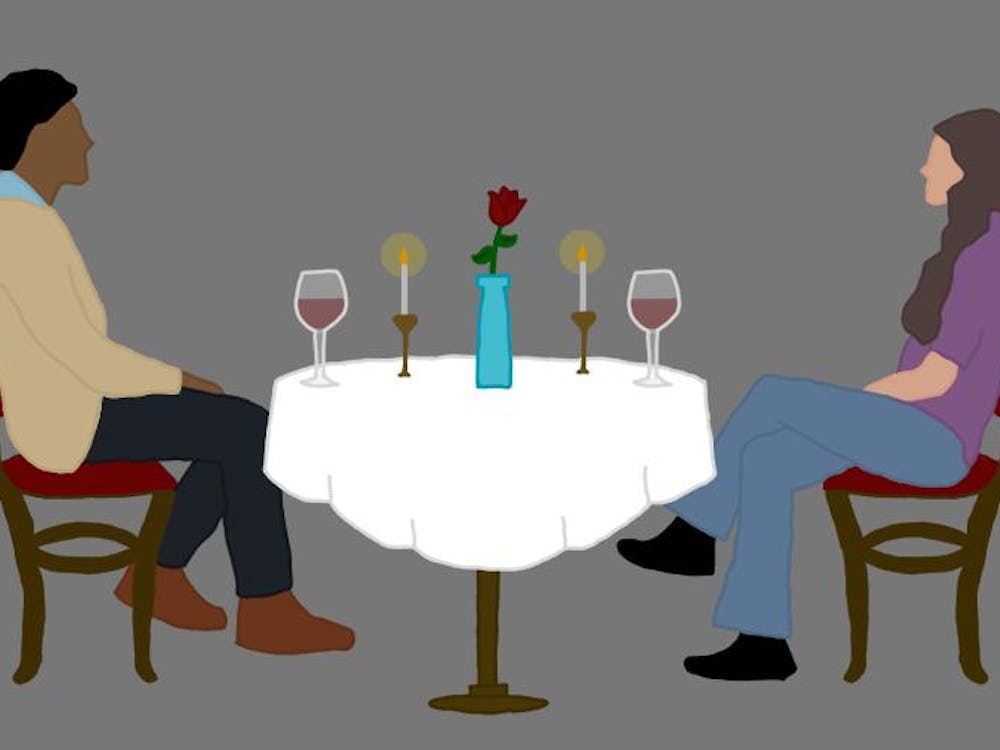Daniel McNamara is on the lookout. Even on slow Wednesday night, he's checking for fake IDs and watching the line outside Buddhist Biker Bar.
If you want to get in the door, you'll have to get past his poker-face gaze.
He is The Bouncer, a familiar breed in a college town, where bars have to ward off underage drinkers. Often brute in strength and dominating of presence, these men were born to intimidate not only with their size, but with their matching assertiveness and steadfast authority.
And with the Corner's constant flux of under-21 patrons, the gatekeeper's job won't be extinct anytime soon.
McNamara, a 2002 alumnus and English major, began working as a bouncer at the Elliewood Avenue bar three months ago. It's 10 p.m., early in McNamara's shift, which won't end before 2 a.m. Patrons filter slowly into the bar -- each one passing through his checkpoint, only admitted after proving their age with a valid ID.
After a stern look at each ID in a group of students, McNamara turns with a friendly smile to talk about his experience as the new bouncer on the block.
McNamara explained that there are really no specific prerequisites for a bouncer, although a certain attitude is required.
"You have to be mean, fight dirty and be prepared to rough-house once in awhile," he said.
Despite his lack of long-term experience, McNamara still can swap stories with the best. McNamara recalls having to remove one of Buddhist's patrons -- not from the bar -- but from the roof.
"I think that he was trying to pee off of it," he said.
Removing highly inebriated and out-of-control patrons from the bar makes up a significant portion of a bouncer's duty. Grant Bates, a manager at The Biltmore, recalls his former days as a bouncer, and some of the downsides of the job.
"Kicking people out can be a pain," Bates said while leaning casually against the hostess' podium in the entrance to The Biltmore. "Sometimes you really just have to be loud."
McNamara puts a creative twist on the task. Getting bored with the age-old bouncer phrase, "get out!" McNamara often says he adds, "You're all alcoholics" to his order.
He finds that mixing humor with force can be more effective than yelling the same tired phrase repeatedly.
Although McNamara has found that attitude is much more important than brute size, Bates explains that inevitably, size is a plus when you are working at some of the larger bars.
O'Neill's Irish Pub, a popular U.Va. bar, tends to employ former football players as bouncers, and Bates' own Biltmore currently has five wrestlers. Because of the high amount of traffic larger bars encounter, and the greater risk for fights and rowdiness, Bates says that, "bigger bars need bigger bouncers."
If Bates and McNamara are inside holding down the fort, other bouncers take preventative measure by policing the entrance -- namely deciding who gets in and who doesn't.
With over half the University's students under 21, a fake ID is an ever-present challenge to the bouncers' judgements.
Orbit bouncer Dan Murray, a current Charlottesville resident says that after six-and-a-half years of working the door, he still is amazed at how many fakes he sees in just one night.
"Sometimes I will see as many as a couple hundred a night," Murray says as he steps outside the loud bar entrance for a brief moment.
But not every fake will make its way through the doors. Any reputable bouncer can spot a fake from the end of the line.
"You can tell by the way people act -- they'll get in a group and talk nervously before approaching the door," Bates says.
To confirm any suspected fakes, Bates finds that a series of tried and true questions, such as birth date and social security number often reveal a fake immediately.
"No one seems to be prepared with all of the ID information memorized," says Bates.
Other times, no special strategy is required to detect a fake ID. Experienced bouncers often swap stories of outlandish attempts to pass off a fake.
Murray says, "It's always funny to see an ID holder with a height or race that totally contradicts what the card reads."
Murray recounted one instance where a white patron attempted to use an Asian man's ID as his own. Bates' experiences have been similar.
He says, "I once had a white girl hand me a black girl's ID."
It seems like a no-brainer, but decisions of who to let in become more complicated when friendship, flirting and favors come into play. From eager acquaintances to flirtatious fawning, bouncers must learn to spot patrons' sly attempts to take advantage of them.
"You meet a lot of nice girls in the line who flirt with you, but you have to be careful that you are not getting used," McNamara said.
Although being a true friend of the bouncer might be helpful in gaining entrance to the bar, it's nothing like the standard on Rugby, where knowing a "brother" lets you and your five friends in the door.
Even with temptations to do a friend a favor, bouncers are on the job. They are obligated to uphold the standards of the bar in a professional manner.
Though many tasks of a bouncer seem trying and burdensome, the job certainly has definite upsides. Though the hours of 10 p.m. to 2 a.m. may seem extreme for some, they are ideal for those who need to work a day job as well. It is also a great line of work for those who love the bar atmosphere.
Bates and McNamara agree that the best part of the job is being able to hang out at the bar and meet new people every night.
"For the most part, I get to sit and chill between checking IDs especially on slow nights," McNamara said.
When the music ends, the taps stop flowing and the customers finally stumble home, McNamara and the other bouncers on the Corner still have some work to finish before they can unwind and grab a nice cold one.
But they better have their IDs.






